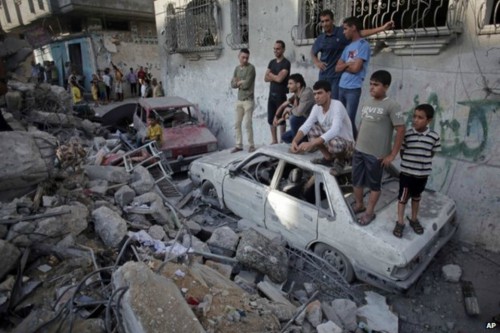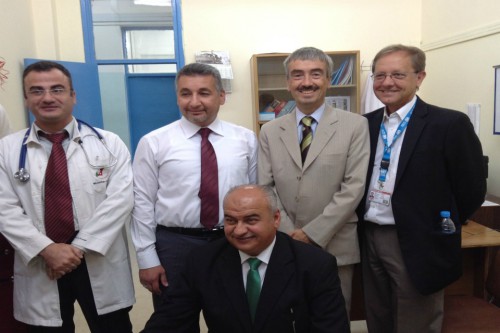20th August 2014
Helping Palestinian Refugees
How to help refugees is a major issue in Jordan. As a country, Jordan has offered sanctuary to generations of refugees from many neighbouring countries, most recently from Syria. But the presence of over 2 million refugees from Palestine also presents a major challenge to the country. That is where the role of UNRWA comes in. It is a role that has been highlighted in recent weeks by the tragedy of Gaza.

Reading the press reports from Gaza has brought home the reality of the impact of the violence on ordinary Palestinian families. That reality becomes more tangible when you meet refugees face to face. In the last 3 years, I have met refugees of all generations from Palestine, Syria and Iraq. They have told their stories of fleeing their homes, escaping the brutality of war and armed conflict, seeking shelter and, importantly, wanting to go home. As donors, we have to help both the refugees and the countries and agencies that are generously helping them.
UNRWA has been helping Palestinian refugees for over 60 years. Operating under the awkward title of United Nations Relief and Works Agency, UNRWA was set up in 1949. At that time, the United Nations was responding to the needs of 750,000 refugees from Palestine; it now has some 5 million refugees who are eligible for its services. UNRWA provides education, health care and protection in 58 camps in Jordan, Lebanon, Syria, the West Bank and Gaza. Their mission is not just to provide relief and social services but also to help people achieve their full potential in human development.
I have visited UNRWA camps in and around Amman, Jerash and Irbid. Many have merged into the fabric of the cities. In all of them, despite the poverty and cramped conditions, there is an atmosphere of hope, especially in the schools where young people have ambitions and dream of a better future. They don’t want to be a burden; they want to contribute to the economic development of Jordan. Small projects can make a difference. I have seen the way UNRWA provides money for women to set up small businesses; or helps to renovate buildings so that families can have decent housing.

UNRWA now needs to rebuild shattered lives in Gaza. The images of destroyed buildings and frightened civilians have made a major impact round the world. There are still over 225,000 people sheltering in 81 UNRWA schools. Some of the most terrible reports came from the shelling of 3 of those schools and the loss of civilian life that resulted.
UNRWA’s Commissioner General Pierre Krähenbuhl has been clear about UNRWA’s continuing commitment in Gaza. This not only means continuing to provide shelter, but also to supply food and water to families whose homes have been destroyed or who have sought shelter from the UN. Rebuilding schools and hospitals and repairing the water supply are top priorities.
The international community has to help UNRWA, not only in its immediate tasks in Gaza, but also in the longer-term efforts for refugees in other countries. The European Union is a major donor providing 43.7% of UNRWA’s budget.
The UK is one of the largest donors, contributing £107m for UNRWA over the current 4-year period as well as providing support to other agencies who work with UNRWA such as the World Food Programme (WFP) and International Committee of the Red Cross (ICRC).
For the crisis in Gaza, the UK has donated more than £19m in emergency assistance to help tens of thousands of people who have lost their homes.
Of course, helping UNRWA to deal with the refugee crisis can only provide temporary relief. The priority has to be a permanent end to the violence so that UNRWA can address the dire humanitarian situation there. In the longer term, there has to be a comprehensive negotiated solution that will allow both Israelis and Palestinian families to live without fear of further violence.
Dear Peter ,
sorry for posting these lines a little bit late. But the reason is easy to explain :last FRI.-Eve., 10/10/14 , I ´ve wateched a BBC London (Middle East section) documentary & was total shocked ´cause of this horrible human disaster of the Palestinian – refugees , esp. in Jordan. Well , to be honest : ´till this BBC Special I only knew little or nothing at all ´bout the ” 2 millions” Palestinian victims. In other words : on 1 side it ´s a shame & even more that people have to suffer amongst such incredible horror conditions as in yr. above mentioned UNRWA camps in Jerash or Irbid. But it ´s a good 1st. sign , that “images of destroyed buildings and civilians so full of fear have made a major impact ´cross the world…”. For you only can avoid such tragedies in the FUTURE – if you know the truth TODAY.
So it ´s also a fact of this truth that Israel ´s Gov. is most responsible for this disaster. Pls. don ´t get me wrong but HOW LONG will it still take ´till Jerusalem ´s Knesset just say “YES” to this well known & fair 2-states-solution ? It ´s in my opinion the only way to get peace & finally stop
violence . I do mean : what ´s going on in this “Likud” party if even the USA , Great Britain & France are suggesting such a solution.
“…every conflict starts in the heads of the people- every end of it in the heads too / Jeder Konflikt fängt in den Köpfen an – jedes Ende aber auch…”.
( Egon Erwin Kisch , “write this story / schreib das auf” , 1919, a reflection book of the 1st. Great World War ).
Best wishes , take care
& a peaceful Sunday , liebe Grüßle , pass auf Dich auf & ond oin friedlicher Sonntag, Ingo-Steven , Stuttgart